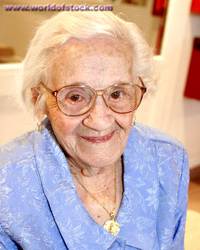HUNDRED AND STILL MILKIN
 100 year old prostitute still going strong
100 year old prostitute still going strong
By Tessie Theuma – Happy fluffy story correspondent
Sitting on her plastic-covered scarlet arm-chair in the boudoir of her Gzira home, one would be forgiven for thinking Doris Borg is just a regular sweet old granny. But while she is indeed sweet as kannoli, she also has a more illicit side: she is Malta’s oldest working prostitute.
The silver-haired “anzjana tat-triq“, as she calls herself, celebrated her birthday on January 2, surrounded by prominent politicians, businessmen, lawyers and members of the clergy, all of whom were in costume to protect their identities. “I so enjoyed lapping up their warm greetings,” she beams.
Doris says she has been in the world’s oldest profession ever since she can remember. She comes from a long line of ladies of the night. “My mother was a prostitute, and her mother before her. Her mother was a cloistered nun so I’m not sure what happened there. There hasn’t been a proper male member of the family for generations.”
During her long life, the centenarian has lived through her fair share of momentous events. She has particularly fond memories of World War II. “All those marines,” she says wistfully. “Some historians say the invasion of Sicily might not have succeeded had the entire British 51st infantry division not spent a morale-boosting night with me before they shipped out.”
How has she managed to live for so long? “Well I’m lucky enough to do what I love, even though I don’t love who I do most of the time. I’ve never had a break, except for my hip of course.
“Also, a Ghanaian former witchdoctor once told me his seed had life-giving properties. It appears to have worked.”
Doris admits that due to her advanced age, the market she caters for is somewhat niche. “For men who are almost into necrophilia but not quite” say her ads on Maltapark. “Oh yes, I’m very web savvy,” she says. “One of my last clients, bless him, was a shy computer programmer, and he set up a Facebook page for me, which really helps to set up appointments since I can only cover about 30 metres of pavement in a day nowadays, and that’s with my Zimmer frame.
She says advanced age has several advantages. “Losing all my teeth has been a Godsend, I can tell you. And if someone has a foot fetish, but also likes breasts, in my case they’re in the same general area.”
Being more than a century old certainly hasn’t diminished her creativity either. “I can do more things with a tire-swing and a rolling pin than you could ever possibly imagine.”
What does she think of her younger counterparts? “Bah, in my day we used to learn everything on the job, if you’ll pardon the pun. Hookers today don’t know they’re born, with their MCAST courses and ETC training schemes.”
Despite the fact that her more glamourous days are arguably behind her, Doris has no intentions of retiring any time soon. “No matter how old I get I won’t stop bending over backwards to make sure my clients are satisfied.”
GUHZUM UP DEH WID DI JONESES
Crystal Harrison & Paula Gordon, Star Writers
If you think uptown stores are missing out on the booming obeah business, think again.
A recent trip made by THE WEEKEND STAR team to a prominent store in the Kingston 8 area literally raised eyebrows, and caused jaws to drop in disbelief based on the products that were being sold in the ‘uptown store’.
With prices starting from $380, perfumes such as ‘Success Water’, ‘Prosperity’, ‘Mr Success’, ‘One Drop of Love’, ‘Money Grabber’ and ‘Do as I Say’ were readily available.
Some of the other nicely packaged items on display included candles of different colours and sizes, sprinkling salts and body oils with prices starting from $180.
Among the candles were some labelled ‘Fast Luck’ and ‘Controlling’, also on display was an instructional chart giving the different candle colours and meanings.
Interestingly, during THE WEEKEND STAR’s visit to the busy store, our team was just in time to meet an ‘obeah man’, who is also a taxi operator, and his wife who were purchasing their monthly supply of products.
A member of the team, acting under the guise of a worried woman who just lost her lover, approached the obeah man’s wife for advice. The reporter was told by the wife that she lost her man because she was not giving him enough sex.
“Don’t worry yourself, just buy two pink panties and go a sea fi two mornings and bathe wid a blue rag, when yuh bathe with the blue rag just remember to leave it there. Yeah man, fi di two mornings remember to use a new rag each time and when you do dat just give me call. Si mi number here,” the obeah man said.
When contacted later by THE WEEKEND STAR for a comment, a supervisor at the store said that they were merely in the business of selling candles and perfumes and that the store is not an obeah store.
She explained that persons from all walks of life visit the establishment, including Catholics, Anglicans and Methodists.
She did, however, say that almost all Jamaicans believe in obeah but they do not give advice to persons who are interested in buying a product for specific reasons.
Meanwhile, when THE WEEKEND STAR made checks with Deputy Superintendent Altemorth Campbell, who is attached to the Flying Squad, he explained that the practising of obeah is illegal.
“The practice is illegal, but it cannot be hearsay. The police have to get evidence for court. If convicted an individual is liable to a fine not exceeding $100 or be imprisoned for a term not exceeding 12 months,” Campbell said.
THE GREAT COMMISSION OF JESUS CHRIST- GOODMORNING

The Great Commission of Jesus Christ – Where is my Jerusalem?
When considering the Great Commission of Jesus Christ and how it applies to our lives today, we should ask, “Where is my Jerusalem?” There are multiple records in Scripture of the Great Commission given by Jesus Christ to His followers (Matthew 28:18-20; Mark 16:15-16; Luke 24:45-48; John 20:21; Acts 1:8). In two of these accounts (those in Luke and Acts). it is specifically noted that the carrying out of the Great Commission of Jesus Christ is to begin in Jerusalem.
Jerusalem was the place Jesus instructed His followers to wait for His timing. “On one occasion, while he was eating with them, he gave them this command: ‘Do not leave Jerusalem, but wait for the gift my Father promised, which you have heard me speak about.'” (Acts 1:4).
This was also the place they were to begin their ministry of telling others about Him, teaching the good news of salvation in Christ, baptizing, and discipling those new believers in the teachings of Christ, including the Great Commission. They were to start obeying the command from the place where they were when they received it.
“But you will receive power when the Holy Spirit comes on you; and you will be my witnesses in Jerusalem, and in all Judea and Samaria, and to the ends of the earth” (Acts 1:8).
In the same way, we are to start obeying the Great Commission of Jesus Christ from where we are when we receive it.
In addition to being the place where they were located at the time the command was received, Jerusalem was the traditional center of worship in that time. “Then he opened their minds so they could understand the Scriptures. He told them, ‘This is what is written: The Christ will suffer and rise from the dead on the third day, and repentance and forgiveness of sins will be preached in his name to all nations, beginning at Jerusalem. You are witnesses of these things.'” (Luke 24:45-48).
Today, Jesus Christ uses the local church as an instrument of instruction, as one way of teaching us how to understand and obey the Scriptures. In this way, it could be said that the church is where we start, because in a Bible-teaching church we receive instruction, enabling us to go out from there in obedience to the Great Commission. It plays a part in our Jerusalem, both in location and in instruction.
For many of the people who first received this command, Jerusalem was likely the place where they lived. Some were called to that place by the command of Christ to wait there. Regardless of why they were there, the bottom line is that they were there.
Being a witness in Jerusalem applies to us today as being a witness to those who live near the place where we are, as well as to those in our sphere of influence. Because of the ease of travel and communication that we enjoy in our time, our “Jerusalem” may encompass a much larger geographical area. We generally do not have to walk to neighboring towns or depend on wind – or manually-powered boats to take us to our destinations, nor do most of us depend on camels or other animals to carry us where we would go as was true in Jesus’ day. However, our Jerusalem still centers around the location and contacts of our daily lives.
So, “Where is my Jerusalem?” We are to be witnesses to those who live next door, down the street, or across town. Our lives and our words should be a testimony to those with whom we come in contact, from family members and business associates to the clerk at the grocery store or the aerobics instructor. People all around us need to hear the Good News of Jesus Christ, and we must open our eyes and our hearts to see where God is working. Wherever our daily lives take us or the leading of God directs us in and near the routine of our lives – that is our Jerusalem.
R.I.P ETTA JAMES
Etta James, whose powerful voice and passionate delivery created some of music’s most iconic love songs such as “At Last,” has died at the age of 73 from complications from leukemia, her manager said Friday.
James had been suffering from dementia and kidney problems, and was battling leukemia. In December 2011, her physician announced that her leukemia was terminal, and asked for prayers for the singer.
During her illness, her husband Artis Mills and her two sons fought bitterly over control of her $1 million estate, though a deal was later struck keeping Mills as the conservator and capping the singer’s expenses at $350,000.
Related Slideshow
Soul singer Etta James: 1938-2012
The legendary soul singer died Friday from leukemia complications.
James died at Riverside Community Hospital, with her husband and sons at her side, her manage, Lupe De Leon, said.
“It’s a tremendous loss for her fans around the world,” he said. “She’ll be missed. A great American singer. Her music defied category.”
Boldness was as much a trademark of James, a member of the Rock and Roll Hall of Fame, as her platinum-dyed mane.
She scored her first hit when she was just a teenager with the suggestive “Roll With Me, Henry,” which had to be changed to “The Wallflower” in order to get airplay. Over the years, she’d notch many more, carving a niche for herself with her husky, soulful voice and her sassy attitude, which permeated her songs.
But it was her jazz-inflected rendition of “At Last” that would come to define her and make her legendary. The song, which starts with sumptuous strings before James begins to sing, was a remake of a 1941 standard. James made it her own, and her version became the new standard.
Over the decades, countless brides have used it as their song down the aisle, and it has been featured in car commercials and films like “American Pie.” But perhaps most famously, Obama and the first lady danced to a version of “At Last” at his inauguration ball.
But the tender, sweet song belied the turmoil that James — born Jamesette Hawkins in Los Angeles — would endure for much of her life. Her mother — whom she described in her 1995 autobiography “Rage to Survive” as a scam artist, a substance abuser and unstable — was a fleeting presence in her life during her youth.
She never knew her father, although she had been told that he was the famous billiards player Minnesota Fats. When she was older, she met him and asked about the rumor. He wouldn’t confirm or deny it: as James recalled, he simply told her: “I don’t remember everything. I wish I did, but I don’t.”
Her mother would come in and out of her life, so she was raised by Lula and Jesse Rogers, who owned the rooming house her mother once lived in. The pair brought up James in the Christian faith, and even as a young girl, her voice stood out in the church choir. James would soon get solos and became so well known, she said that Hollywood stars would come to see her perform.
But she wouldn’t stay a gospel singer for long. Rhythm and blues soon lured her away from the church, and she found herself drawn to the grittiness of the music.
“My mother always wanted me to be a jazz singer, but I always wanted to be raunchy,” she recalled in her book.
She was doing just that when bandleader Johnny Otis found her singing on San Francisco street corners with a couple of girlfriends in the early 1950s.
“At the time, Hank Ballard and the Midnighters had a hit with `Work With Me, Annie,’ and we decided to do an answer. We didn’t think we would get in show business, we were just running around making up answers to songs,” James told The Associated Press in 1987.
And so, they replied to Ballard with the song “Roll With Me, Henry.”
When Otis heard it, he told James to get her mother’s permission to accompany him to Los Angeles to make a recording. Instead, the 15-year-old went home and forged her mother’s name on a note claiming she was 18.
“At that time, you weren’t allowed to say `roll’ because it was considered vulgar. So when Georgia Gibbs did her version, she renamed it `Dance With Me, Henry’ and it went to No. 1 on the pop charts,” the singer recalled. The Gibbs song was one of several in the early rock era where white singers got hits by covering songs by black artists, often with sanitized lyrics.
After her 1955 debut, James toured with Otis’ revue, sometimes earning only $10 a night. Things changed for the better in 1959, when she signed with Chicago’s legendary Chess label and began cranking out the hits and going on tours with performers such as Bobby Vinton, Little Richard, Fats Domino, Gene Vincent, Jerry Lee Lewis and the Everly Brothers.
“We would travel on four buses to all the big auditoriums. And we had a lot of fun,” she recalled in 1987.
She also had a lot of success. James went on to record a string of hits in the late 1950s and `60s including “Trust In Me,” “Something’s Got a Hold On Me,” “Sunday Kind of Love,” “All I Could Do Was Cry,” and of course, “At Last.”
Chess Records, whose founder, Leonard Chess, called James their first soul singer, she wrote.
“He went up and down the halls of Chess announcing, `Etta’s crossed over! Etta’s crossed over!’ I still didn’t know exactly what that meant, except that maybe more white people were listening to me. The Chess brothers kept saying how I was their first soul singer, that I was taking their label out of the old Delta blues, out of rock and into the modern era. Soul was the new direction,” she said in her autobiography. “But in my mind, I was singing old style, not new.”
In 1967, she cut one of the most highly regarded soul albums of all time, “Tell Mama,” an earthy fusion of rock and gospel music featuring blistering horn arrangements, funky rhythms and a churchy chorus. A song from the album, “Security,” was a top 40 single in 1968.
Her professional success, however, was balanced against personal demons — drug addiction.
“I was trying to be cool,” she told the AP in 1995, explaining what had led her to try heroin.
She was addicted to the drug for years, beginning in 1960, and it led to a harrowing existence that included time behind bars and sapped her singing abilities and her money, almost destroying her career. It would take her at least two decades to beat her drug problem — her husband even went to prison for years, taking full responsibility for drugs during an arrest, even though James was culpable.
“My management was suffering. My career was in the toilet. People tried to help, but I was hell-bent on getting high,” she wrote of her drug habit in 1980.
After she hit rock bottom, she finally quit the habit and managed herself for a while, calling up small clubs and asking them, “Have you ever heard of Etta James?” in order to get gigs. Eventually, she got regular bookings — even drawing Elizabeth Taylor into an audience. In 1984, she was asked to sing the national anthem at the Olympic Games in Los Angeles, and her career got the resurgent boost it needed, though she fought addiction again when she got hooked on painkillers in the late 1980s.
Drug addiction wasn’t her only problem. She struggled with her weight, and often performed from a wheelchair as she got older and heavier. In the early 2000s, she had weight-loss surgery and shed some 200 pounds.
James performed well into her senior years, and it was “At Last” that kept bringing her the biggest ovations. The song was a perennial that never aged, and on Jan. 20, 2009, as crowds celebrated that — at last — an African-American had become president of the United States, the song played as the first couple danced.
James did get her accolades over the years. She was inducted into the Rock Hall in 1993, captured a Grammy in 2003 for best contemporary blues album for “Let’s Roll;” one in 2004 for best traditional blues album for “Blues to the Bone;” and one for best jazz vocal performance for 1994’s “Mystery Lady: Songs of Billie Holiday.” She was also awarded a special Grammy in 2003 for lifetime achievement and received a star on the Hollywood Walk of Fame.
But her health went into decline, and by 2011, she was being cared for at home by a personal doctor. A struggle between her sons and her husband developed as she became more ill, as he sought to control her estate. Her sons, Donto James and Sametto James, had power of attorney over her affairs.
Read more: http://www.foxnews.com/entertainment/2012/01/20/singer-etta-james-dead-at-73/#ixzz1k2NpmDv7
R.I.P WINSTON RILEY
Winston Riley is dead
Veteran producer succumbs to gunshot wound in head after months in coma
Jamaica Observer
Friday, January 20, 2012
RECORD producer and songwriter Winston Riley is dead.
Riley died in hospital yesterday from the effects of a gunshot wound he received last year. He was in a coma since he was attacked and shot in the back of the head in November last year.
Riley…died in hospital yesterday
1/1
Winston, who was the father of Fame FM disc jockey Kurt Riley, had been plagued by a series of violent attacks. He was shot in August last year and later stabbed five times in September.
Kurt Riley told the Observer this morning that his father’s grieving relatives could not figure out a motive behind the attempts on his father’s life.
“Unfortunately Daddy didn’t wake up so we could talk to him to find out if there was something he was not telling us. He was a straightforward man, who was allergic to hypocrisy,” he said.
Winston Riley produced the late General Echo’s The Slackest album on his Techniques label in 1979, and was instrumental in the development of the careers of Sister Nancy, Buju Banton, Cutty Ranks, Lone Ranger, and Frankie Paul.
Read more: http://www.jamaicaobserver.com/entertainment/Winston-Riley-is-dead#ixzz1k20TAk9t
****RULES**** 1. Debates and rebuttals are allowed but disrespectful curse-outs will prompt immediate BAN 2. Children are never to be discussed in a negative way 3. Personal information eg. workplace, status, home address are never to be posted in comments. 4. All are welcome but please exercise discretion when posting your comments , do not say anything about someone you wouldnt like to be said about you. 5. Do not deliberately LIE on someone here or send in any information based on your own personal vendetta. 6. If your picture was taken from a prio site eg. fimiyaad etc and posted on JMG, you cannot request its removal. 7. If you dont like this forum, please do not whine and wear us out, do yourself the favor of closing the screen- Thanks! . To send in a story send your email to :- [email protected]



Recent Comments